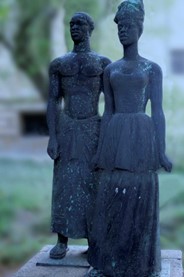Rethinking the Enlightenment: Anton Wilhelm Amo (c. 1703 to c. 1753)
One of the most remarkable historical Black German subjects was Ghanian Enlightenment philosopher, Nzima Antonius Wilhelm Amo Afer (c. 1703 to c. 1753), who, against the odds (his brother was enslaved in Surinam), became one of the greatest thinkers of the German Enlightenment. Amo, a native of Nkubeam (now Ghana), was likely kidnapped from his home and presented as a child-gift from the slave-trading Dutch West India Company to Duke Anton Ulrich of Braunschweig-Wolfenbüttel.[i] In 1707 the Duke had Amo baptized with his own and his son’s names. There is then no further public record of the boy until 1727 when he matriculated in philosophy and liberal arts from the University of Halle, producing his first disputation in Latin, On the Rights of Moors in Europe [De Jure Maurorum in Europa], ‘likely the first defence of Black people written on German soil’.[ii] Whilst undertaking his studies, Amo had been immersed in the progressive thinking of the Enlightenment, including that of his mentor Christian Thomasius as well as Christian Wolff and Gottfried Wilhelm Leibniz.[iii] The intellectual atmosphere in Halle was nevertheless fraught between Enlightenment philosophers who believed in science, reason and knowledge and the theologians who advocated asceticism and morality in the service of God. Furthermore, as Jacob Emmanuel Mabe has commented:
‘There is no doubt that Amo as a philosopher saw himself personally confronted with the central paradox of the European Enlightenment with reference to the sinful character of slavery as well as the question of the legality of racial discrimination. The trade in human beings, of which he was a victim, was incompatible, not only with natural law and human rights, but also with the spirit of humanism and the rationale of the Enlightenment...’[iv]
In 1730 Amo left Halle for further study at the University of Wittenberg and in 1734 he became the first black African to successfully publicly defend a doctorate in philosophy and letters from a German university, On the Impassivity of the Human Mind [De Humanae Mentis Apatheia]. Between 1734 and 1736 Amo lectured in philosophy at Wittenberg before returning to the University of Halle where between 1736 and 1739 he continued to teach and supervise his own doctoral students. Whilst in Halle for the second time he wrote one his most important works, Treatise on the Art of Philosophizing Soberly and Accurately [Tractatus de Arte Sobrie et Accurate Philosophandi]. Then, in 1740, he took up a post at the University of Jena where he taught until 1746. There is some evidence to suggest that around this time he attempted, unsuccessfully, to marry. It was likely that Amo was increasingly subjected to public racism, which may finally have prompted his decision to leave Europe. From 1740 to 1748 Germany was embroiled in the Austro-Prussian war and support for early Enlightenment thinking was waning. Records housed in the Dutch National Archives show that Amo boarded a ship named the ‘Catharina Galey’ which set sail from Rotterdam to the Gold Coast on 20 December 1746.[v] He arrived in Africa the following April and lived the remainder of his life in the Dutch coastal fortress of Chama.[vi]
Amo (like Saint Maurice before him) is an unusual example of a Black German whose fabled life story stands out within orthodox narratives of German history precisely because of its exceptionalism. Nevertheless, it serves as important milestone in the German national story leading up to the Berlin West Africa Conference of 1884-1885 and reminds us to beware of the occlusions within historicist narratives of nationhood.
[i] There are a variety of available accounts about the existence and achievements of Amo, some of which vary slightly in historical detail but all of which follow the same basic account. See for example Burchard Brentjes ‘Anton Wilhelm Amo, First African Philosopher in European Universities’ Current Anthropology vol.16, no.3 September 1975, 443-444; Reginald Bess ‘A.W.Amo: First Great Black Man of Letters’ Journal of Black Studies, vol.19, no.4 June 1989, 387-393; Marilyn Sephocle ‘Anton Wilhelm Amo’ Journal of Black Studies, vol.23, no.2 Special Issue: The Image of Africa in German Society, December 1992, 182-187 and more recently Jacob Emmanuel Mabe Anton Wilhelm Amo interkutlurell gelesen, Nordhausen 2007.
[ii] Sara Lennox ‘Introduction’ Remapping Black Germany, Boston, 2016, 13.
[iii] Marilyn Sephocle ‘Anton Wilhelm Amo’ Journal of Black Studies, vol.23, no.2 Special Issue: The Image of Africa in German Society, December 1992, 184.
[iv] Jacob Emmanuel Mabe Anton Wilhelm Amo: the intercultural background of his philosophy, Nordhausen, 2007, 199.
[v] Jacob Emmanuel Mabe Anton Wilhelm Amo, 2007, 255.
[vi] Details of his death remain uncertain and all of the scholarly sources cited in this Introduction differ in their accounts and in their proposals for the year of his death, sometime after 1752 or 1782. Mabe’s 2007 account is the most comprehensive though. Jacob Emmanuel Mabe Anton Wilhelm Amo, 2007, 287.

